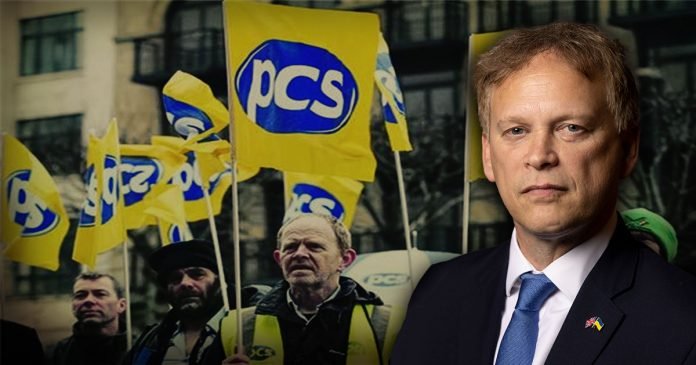
Around 100,000 civil servants are to strike on February 1 in a worsening dispute over jobs, pay and conditions, the Public and Commercial Services union has announced.
The PCS national executive committee has agreed to call a one-day strike on 1 February of all members in employers where the turnout passed the 50% threshold required by law for action in our ballot last year.
The union called it “a fantastic result with a massive average ‘Yes vote’ for industrial action across the areas balloted of 86.2%, the highest percentage vote in the union’s history.”
This means around 100,000 civil servants have voted for a national strike over pay, pensions and jobs.
The Public and Commercial Services Union (PCS) announced:
“We are now in a position to call significant industrial action in support of our claim for a 10% pay rise, pensions justice, job security and no cuts to redundancy terms”, a statement from the union said.
General secretary Mark Serwotka said: “The government must look at the huge vote for strike action across swathes of the Civil Service and realise it can no longer treat its workers with contempt.
“Our members have spoken and if the government fails to listen to them, we’ll have no option but to launch a prolonged programme of industrial action reaching into every corner of public life.
“Civil servants have willingly and diligently played a vital role in keeping the country running during the pandemic but enough is enough.
The Union spokesman said it was to publish the full results, including the sectors that will be affected. Those to strike could include border force officials, driving test examiners and Jobcentre staff.
On Tuesday Business secretary Grant Shapps outlined new proposed laws which would give the government powers to ensure some public servants must continue to work during strike action.
In reply, the civil service union PCS has said: “The government’s attempt to make it harder for public sector workers, including civil servants in the Border Force, to go on strike is “reprehensible, provocative and vindictive”.
The bill would allow employers in “critical public sectors” to maintain minimum levels of service during strikes, the Department for Business, Energy and Industrial Strategy said. If unions failed to comply with the obligations, they would lose legal protection from damages.
Mark Serwotka, PCS’s general secretary, said: “We shall oppose this hostile legislation to protect our members’ rights.
“It’s reprehensible, provocative and vindictive, and we’ll fight the legislation every step of the way.”
Serwotka said the bill “puts power in the hands of the wrong people”.
“It gives all the power to ministers and employers instead of our members who are being denied their democratic right to strike,” he said.
“It paves the way for workers who have voted for strike action being sacked if they refuse to turn up for work on a strike day. “
Border Force staff who are represented by PCS walked out over the festive period, holding strikes at London Heathrow, London Gatwick, Manchester, Birmingham, Cardiff and Glasgow airports, as well as the Port of Newhaven, on 23-26 and 28-31 December. The government responded by drafting around 600 army personnel in to provide emergency cover.
It’s us against them…
Sunak’s government has intensified efforts to water down strikes after a wave of industrial action across the publis sector last year as wages stagnated and inflation soared. In December, PCS, the civil service’s biggest union, joined nurses, rail workers, Royal Mail staff and others in taking action.
Fellow civil service unions Prospect and the FDA are also considering strike action. The FDA has begun a begun a formal ballot of fast streamers, while Prospect members backed action in an indicative vote held last year and said it would begin a formal ballot soon if its demands are not met.
Cabinet Office minister Jeremy Quin has invited civil service unions for talks to resolve the disputes. The unions have urged ministers to move out of “listening mode” and put meaningful offers on the table to resolve pay disputes.
Support Independent Journalism Today
Our unwavering dedication is to provide you with unbiased news, diverse perspectives, and insightful opinions. We're on a mission to ensure that those in positions of power are held accountable for their actions, but we can't do it alone. Labour Heartlands is primarily funded by me, Paul Knaggs, and by the generous contributions of readers like you. Your donations keep us going and help us uphold the principles of independent journalism. Join us in our quest for truth, transparency, and accountability – donate today and be a part of our mission!
Like everyone else, we're facing challenges, and we need your help to stay online and continue providing crucial journalism. Every contribution, no matter how small, goes a long way in helping us thrive. By becoming one of our donors, you become a vital part of our mission to uncover the truth and uphold the values of democracy.
While we maintain our independence from political affiliations, we stand united against corruption, injustice, and the erosion of free speech, truth, and democracy. We believe in the power of accurate information in a democracy, and we consider facts non-negotiable.
Your support, no matter the amount, can make a significant impact. Together, we can make a difference and continue our journey toward a more informed and just society.
Thank you for supporting Labour Heartlands











